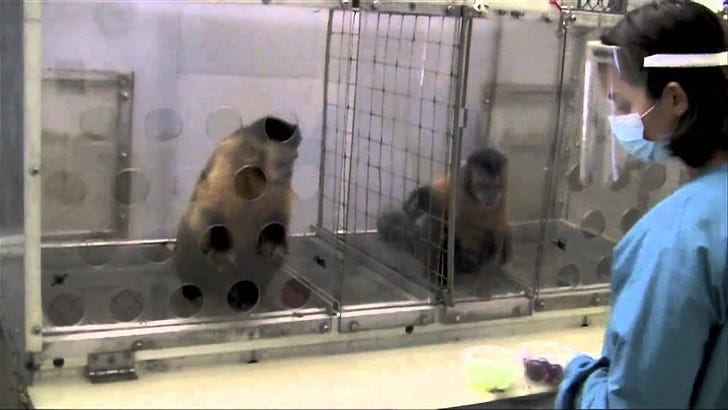There’s a scientist named Frans de Waal, who studies primates in order to determine whether they are able to make moral decisions which we formerly have assumed were the sole province of human beings. His research shows that capuchin monkeys, bonobos, and chimpanzees are all capable of these moral decisions; that is, distinguishing fair treatment from unfair treatment. One of the principle experiments is putting two primates side by side and teaching them a simple task which gets rewarded with food. The experiment comes in when the quality of the food is varied. Two capuchin monkeys are put side by side (in separate cages). If they’re both rewarded with cucumber (a mundane food choice), they’re both content. But, if the scientist starts rewarding one of the monkeys with more desirable grapes, the other monkey becomes irate, throws the cucumber at the scientist, and throws a tantrum.
You can watch the very entertaining video here:
In another experiment, this time with chimpanzees, the chimp who gets the grape will sometimes refuse it until the other chimp also gets a grape. While the first experiment can characterize the irate monkey as self-serving, the second actually shows altruism. The first chimp is intervening on behalf of the other chimp.
deWaal posits the idea that morality and fair play are actually inborn characteristics in primates (and probably in other animals) rather than moral lessons taught by religion or philosophy. He stops short of calling chimps “moral beings”, citing the fact that, while they behave this way in personal encounters, they show no signs of being capable of believing in moral tenets for all beings.
Now, here’s where DeWaal loses me: He infers that human beings are moral beings! He infers that their sense of morality may be inborn. So, if humans are born with a moral sense, and don’t have to learn it from others, I want to know how they learn their immoral or amoral sense? Because it’s clear that our current world is governed with a great deal of unfairness. If we define moral behavior as acting in a way which recognizes the equal rights of all people, what the hell happened to all the supposedly moral beings who are busily ruining the lives of others from their places of power? If they were born with an innate sense of fair play, where did they lose it? And how can we help them get it back? I want the answer to that one…sigh….




May I address your question about morality as it applies to human beings?
Once I read Mary Trump's memoir about her Uncle Donald, I realized that the family dynamics, as determined by the patriarch, told us all we need to know about Trump's immorality. In this case, I don't know if it could have been passed down through DNA or was simply a result of modeling.
Love this video and it's very popular with my students. DerWaal is working in the context of naïve interpretations of Darwin that all organisms are selfish. Much work like his as well as theoretical work shows that's not true. Some of my work and that of many others shows that altruism and self-interest are common in humans and that both predict, in opposite directions, concern with environment. A key addenda is scope of concern. Nearly everyone cares about family, but people vary in how large a group they care about and how that is defined. This allows for bias and polarization and is manipulated politically. For more on animals see animalstudies.msu.edu.